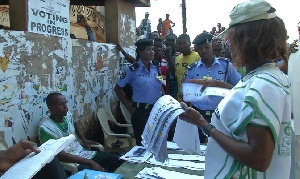By Kwame Okoampa-Ahoofe, Jr., Ph.D.
Since the apocalyptic emergence of Flt.-Lt. Jeremiah John Rawlings on the hitherto placid Ghanaian political landscape some three decades ago, I have had my own doubts regarding the professionalism of the Ghana Armed Forces (GAF) as an institution. On August 27, 2008, retired Chief of Defense Staff (CDS) Brig.-Gen. Nunoo-Mensah confirmed my doubts when he had published on Ghanaweb.com a copy of a protest letter that the former CDS had written and forwarded to Mr. Albert Kan Dapaah, the incumbent Minister of Defense.
In his letter, Gen. Nunoo-Mensah decries the alleged intention of the Ministry of Defense (MOD) to commercially dispose of the official residence of the CDS of the Ghana Armed Forces, located at Number One Roman Ridge. Interestingly, the former CDS acknowledges the fact that the official residence of the substantive Chief of Defense Staff has not been inhabited since the death of Lt.-Gen. Mensah-Wood, presumably sometime in the early 1990s, and also, curiously, that since the death of Gen. Mensah-Wood, under unspecified circumstances, all of the latter’s successor CDS’s have declined occupancy of Number One Roman Ridge for undisclosed reasons. What is quite puzzling is the fact that during most of the period that the official residence of the CDS was deliberately unoccupied, Flt.-Lt. Jeremiah John Rawlings, the man who ultimately sanctioned the appointment of the successive Chiefs of Defense Staff, was Ghana’s Head-of-State and President, respectively, and thus Commander-in-Chief of the Ghana Armed Forces (GAF). As a professional soldier, himself, it would be nothing short of the utterly flabbergasting if it turns out that Mr. Rawlings, arguably the most security-conscious Ghanaian strongman, had not been aware of the anomalous fact of the various Chiefs of Defense Staff, appointed in the wake of the “demise” of Lt.-Gen. Mensah-Wood, declining occupancy of the official residence of the CDS.
We must also highlight the fact that were Number One Roman Ridge private property, for as long as the property existed, though effectively uninhabited, the Government and people of Ghana would have been due the payment of property taxes. In sum, the logical question to ask is: While Number One Roman Ridge has inexplicably and irresponsibly been allowed to go into virtual desuetude – or disuse – who has been responsible for the payment of property taxes on the official residence of the CDS? Put another way, for as long as successive CDS’ refused to occupy Number One Roman Ridge, and instead continued to live in their old public-supported residences, the Government and people of Ghana were technically and practically saddled with two separate rental bills or payments. And the latter, needless to say, amounts to unnecessarily causing financial loss to the State, a felonious crime punishable by a considerable prison term. And, needless to say, somebody ought to be held accountable for such reckless wastage of public funds.
Instead, what we find in Gen. Nunoo-Mensah’s letter is a barely-veiled threat to vacuously hold the current Government culpable for the patently irresponsible professional conduct of the top-echelons of the Ghana Armed Forces. In sum, based on home-grown common sense, the decision by Mr. Kan Dapaah and the Ministry of Defense to commercially and, presumably, profitably dispose of the disused official residence of the Chief of Defense Staff could not be more appropriate as well as opportune. And to be certain, this decision is long overdue.
Indeed, if virtually every one of the Chiefs of Defense Staff appointed since the death of Lt.-Gen. Mensah-Wood has deemed it quite professionally appropriate, and even downright auspicious, to live off-premises, then it can hardly be gainsaid that Gen. Nunoo-Mensah’s plaint is grossly misplaced. It is, however, quite understandable that the former GAF-CDS should be solicitous about the fact of one of the salient symbols of the professional integrity of the GAF being “vulgarly” and commercially auctioned off to the highest bidder, so it seems.
The preceding notwithstanding, perhaps the unique significance of Gen. Nunoo-Mensah’s letter inheres in the rare and valuable insight that it provides into the apparent clinical megalomania of Mr. Kwame Nkrumah, Ghana’s first president. On the latter score, we quote the relevant portion of Gen. Nunoo-Mensah’s letter as follows: “When I enlisted into the Ghana Army in 1960, I learnt that the Flagstaff House used to be the official residence of the General Officer Commanding the Ghana Armed Forces until the Prime Minister, Dr. Kwame Nkrumah, acquired it as his official residence. The Prime Minister then provided No. 1 Roman Ridge as the official residence of the Chief of the Defense Staff. Successive Chiefs of Defense Staff have [since] occupied this property until after the demise of Lt.-Gen. Mensah-Wood[,] when his successors declined to occupy the residence and rather chose to live in various parts of Burma Camp. Since the early 1990s, like the Flagstaff House until recently, No. 1 Roman Ridge was allowed [sic] to fall into despair [disrepair?] What is required now is not the sale of the property to a private developer but its complete restoration as a fitting residence of the Chief of Defense Staff. The idea of our Chiefs of Defense staff living in various parts of Burma Camp is wrong and should not be sustained [entertained?]” (see “Ex-Defense Chief Shocked” Ghanaweb.com 8/27/08).
In the preceding extract from Gen. Nunoo-Mensah’s letter, it appears that Mr. Kwame Nkrumah committed what may aptly be termed as “THE ORIGINAL SIN” of postcolonial Ghanaian politics by disdaining the professional integrity of the Ghana Armed Forces, thereby setting up the professional “free-fall” of the GAF in motion. Indeed, to further emphasize his utter disdain and abject distrust for the GAF, President Nkrumah would set up his especial and exclusive Presidential Guard, under the tutelage of such Eastern-bloc nations as the erstwhile Soviet Union and East Germany, as well as China. It thus begins to make logical sense that the GAF would eventually and decisively lash back at President Nkrumah and his so-called Convention People’s Party (CPP) via the National Liberation Council (NLC) junta on February 24, 1966. Still, a civically “adversarial” Armed Forces, such as Gen. Nunoo-Mensah subtly hints of in his protest letter, is the last breed of professional soldiery that Ghanaians want to underwrite or materially support.
In the end, however, there is one missing significant puzzle in Gen. Nunoo-Mensah’s protest letter; and the latter regards the circumstances surrounding the “demise” of Gen. Mensah-Wood such as to spook successive Chiefs of Defense Staff into summarily declining to occupy Number One Roman Ridge. We can only attempt a guess on the basis of what we know about the place of anomalous and/or unnatural deaths in the psychology of traditional Ghanaian, and African, culture. Still, a Chief (or Chiefs) of Defense Staff who woefully fails to live up to his professional etiquette is one not worthy of such leadership of the Ghana Armed Forces.
*Kwame Okoampa-Ahoofe, Jr., Ph.D., is Associate Professor of English, Journalism and Creative Writing at Nassau Community College of the State University of New York, Garden City. He is the author of 17 books, including “Ghanaian Politics Today” (Atumpan Publications/lulu.com, 2008). E-mail: okoampaahoofe@aol.com. #########################














